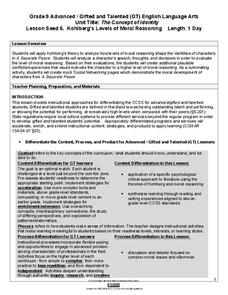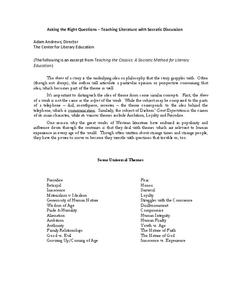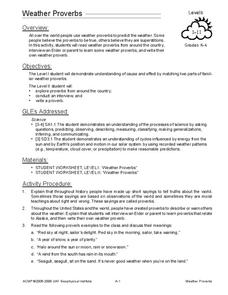Maryland Department of Education
The Concept of Identity Lesson 6: Kohlberg's Levels of Moral Reasoning
How does our moral reasoning shape our identity? After a study of Kohlberg's Levels of Moral Reasoning, readers use Kohlberg's theories to analyze the speech, thoughts, and decisions of a character in A Separate Peace. They then create...
What So Proudly We Hail
A Lesson on Benjamin Franklin’s “Project for Moral Perfection”
Benjamin Franklin identified 13 virtues that he felt would strengthen his character if he could focus on each one. A thorough lesson explores high schoolers' personal values in the context of their lives, and compels them to strive for...
Curated OER
What is moral courage?
Young scholars look at "Anne Frank Trust" winners' profiles and discuss what it means to have moral courage. They choose someone they would nominate for the Anne Frank Awards for Moral Courage.
Curated OER
One Room School House Reading Lesson
Students explore schools during the Colonial period. In this American history instructional activity, students participate in a simulation of school days in Colonial America. Students visit a museum and use the schoolhouse as a setting...
Writing Educators Symposium
Asking the Right Questions
It can be difficult to find the theme of a book or story if you don't know the questions to ask. Teach your kids to discern the universal theme in works of literature with a set of activities that promote critical thinking and active...
Curated OER
The Chosen: Anticipation Guide
"Parents' views on issues should not affect how their children are treated." "Children should respect their parents even if they have different views on issues." Prior to reading chapters 13 through 17 of The Chosen, class members...
Curated OER
Acting Like a Bunch of Animals: Fables and Human
The video "The Tales of Aesop" traces for viewers the history of fables and identifies their characteristics. The class then goes to the web site "The Fisherman and the Little Fish" where they examine the classic and a modern version of...
Curated OER
Homeless in America
Students study the plight of the American homeless. In this homelessness lesson, students define homelessness and watch video segments pertaining to the the American homeless. Students list three reasons people become homeless and five...
Curated OER
Digital Values: Internet Safety
Students explore digital communication by participating in a critical thinking activity. In this Internet safety lesson plan, students discuss ways to protect their identity on the Internet as well as preserving friendships. Students...
Curated OER
Poetry
Fifth graders preview different poetry selections form different poets to narrow their criteria for a favorite poem. They use the web and written sources to find a favorite poem and then give an oral interpretation of their poem in class...
Curated OER
Respecting Nonreligious People
Help students understand what an atheist is and why it is important or respect their beliefs. Using this non believers lesson, students will learn about people who hold different beliefs are discriminated against by others. They will...
Curated OER
Cry, The Beloved Country: Anticipation Guide
“Poor people are poor because they are lazy and don’t work enough.” “If you are desperate, the means justify the ends.” Prior to reading Cry, The Beloved Country, class members complete an anticipation guide that focuses on issues raised...
Curated OER
Reporting on the 1920s
Use this roaring 1920s history instructional activity to have young writers research primary and secondary sources. They use their research to examine the events or famous public figures of the time period. Next, they imagine they're in...
Curated OER
Weather Proverbs
Your class explores weather proverbs and superstitions from around the country and writes their own proverb about weather. They interview community elders to learn proverbs about Alaska and its weather. Then they discuss several example...
Curated OER
Introduction to the Holocaust
High schoolers examine the events surrounding the Holocaust in World War II. After viewing a clip from "The War", they work together in groups to research the various responses from governments on the tradegy. To end the activity, they...
Curated OER
The Crucible
Twelfth graders use an Internet scavenger hunt, vocabulary, sample essay questions, and short answer questions suitable for study and review of the play, The Crucible.
Curated OER
Homeless in America
Young scholars explore society by analyzing current events. In this homeless epidemic lesson, students discuss the problem of people who don't have housing and the adverse affects on everyday people. Young scholars identify ways to...
Curated OER
The Underground Railroad
Students use vocabulary related to the Underground Railroad. They identify key facts related to the Underground Railroad, evaluate their personal responses to the Underground Railroad and make a judgment about the morality of the...
Curated OER
How Prophet-able Are You?
Students examine the role of prophets/advocates in society and define qualities and characteristics of an effective prophet. They list qualities of prophets and discuss which characteristic is most important.
Curated OER
The Adventures of Huckleberry Finn
Students discuss contemporary situations in which governments mistreat people. They examine real-life instances in which people break the law for what they believe is a higher good. They role play a variety of human rights injustices.





















